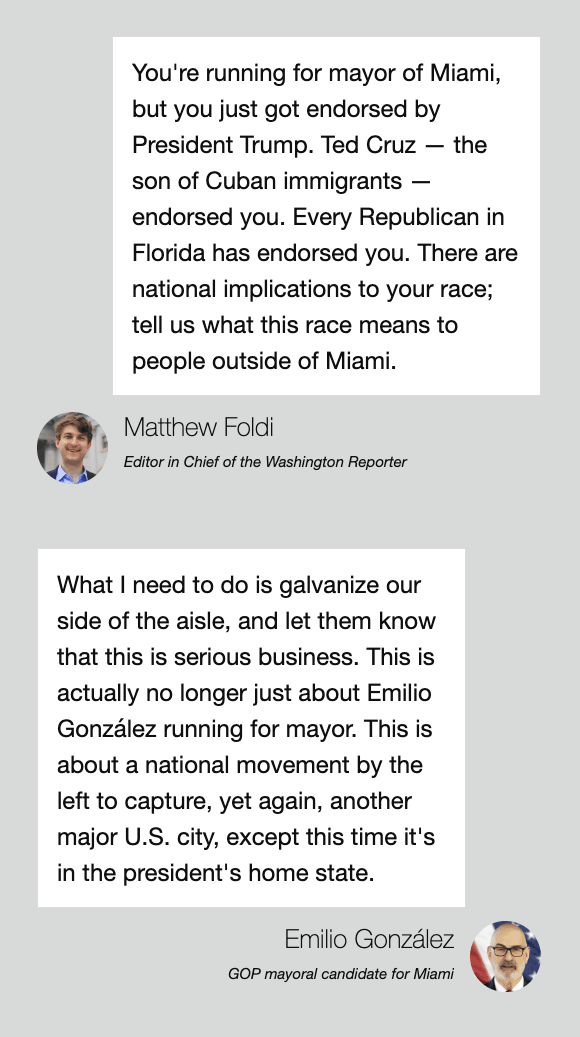|
 |
Emilio González fighting socialism in Miami, House Republicans support Trump’s financial services policies, and the Washington Reporter is hiring!
Why Sen. Bill Cassidy and Trump are in sync on health care, how a Democrat’s real estate holdings complicate her campaign message, the Pentagon trades missile defense barbs with a new movie, and more!
For advertising opportunities to reach our audience of center-right policymakers, contact [email protected]
November 20th, 2025
News of our own: We are hiring!
The Washington Reporter is hiring two roles, and we pay above market for the right talent.
A part-time, remote reporter to cover stories impacting the Hill and the Administration
A part-time, remote business development manager to work with advertisers
No journalism experience necessary for the reporter role, although we are looking for someone who works in communications or politics, and wants to help shape the conversation in D.C.
These are fantastic side-gigs for those with an entrepreneurial spirit.
If you are interested, send your resume to [email protected].
Let’s dive in.
INTERVIEW: Miami Mayoral candidate Emilio González on the dangers of electing socialists from coast to coast
Heard on the Hill
EDITORIAL: Republicans should be cautious before voting to overhaul app stores
EXCLUSIVE: Democrat’s luxury real-estate portfolio contradicts her messaging on affordability
EXCLUSIVE: Howard Lutnick proclaims U.S. will win AI race at AI group launch
EXCLUSIVE: New poll shows strong support for Jay Feely in Arizona’s 1st District
SCOOP: Sen. Bill Cassidy explains why he and Trump had a “melding of vision” on health care
SCOOP: Rep. Troy Downing “extraordinarily pleased” about Trump administration’s work on proxy advisor duopoly
OPINIONATED: John Rich on how President Trump and Secretary Rollins are fighting for farmers, General Johnson, Jason Stverak on what Congress should do post-Schumer Shutdown, Jenn Pellegrino on why she’s launching Defend Forgotten America, and John Czwartacki on how to fix Biden’s broadband mess
A message from our sponsor.
The App Store “Freedom” Act undermines parental controls and security on smartphones.
It forces covered app stores to allow third-party stores and payment systems that can host obscene content, creating new avenues for predators to exploit children online.
Tell Congress to say NO.
If you have a tip you would like to anonymously submit, please use our tip form — your anonymity is guaranteed!
INTERVIEW: Miami Mayoral candidate Emilio González on the dangers of electing socialists from coast to coast
by Matthew Foldi
In the wake of several socialist wins from New York City to Seattle, GOP mayoral candidate for Miami Emilio González is fighting against further encroachments of socialism in America.
“There has been nowhere in the world where socialism works, nowhere, and, in fact, everywhere in the world, socialism has killed over 100 million people,” González told the Washington Reporter in an interview. Socialism sounds enticing, he noted, but “it becomes almost a predator state, the government against its people.”
González, who was born in Cuba, thinks campaigns like his are “about a national movement by the left to capture, yet again, another major U.S. city, except this time it’s in the president’s home state.”
Florida is the future home of President Donald Trump’s presidential library; Democrats understand this, González said, and are trying to elect the first Democrat to run Miami in this millennium. “This is an opportunity to stick it to the president; if you can take the president’s signature city, that just emboldens them to go to other places and get someone to roll.”
Heard on the Hill
AI NDAA MORATORIUM dead: Our Hill sources tell us there is “zero percent chance” that AI preemption makes it into the NDAA. “Politically toxic,” said one insider. Downtown: you heard it from the Washington Reporter first!
AN APP FOR THAT: The Republican Study Committee (RSC) released a new app, called Vote Right, which features live House floor coverage and real-time vote updates designed to keep Americans directly connected with what’s happening in Congress. The app is a rival to the Democrats’ DomeWatch. “The Democrats had a monopoly on floor tracking in the House for far too long, and Republicans aren’t ceding that ground anymore,” RSC Chairman Rep. August Pfluger (R., Texas) said. “I promised the Republican Study Committee we would build our own solution, and Vote Right delivers. The app gives members, staff, and Americans across the country real-time legislative news without the liberal spin.”
DEMS IN DISARRAY: Be on the lookout for primary challengers to a series of House Democrats, including Reps. Hakeem Jeffries (D., N.Y.), Dan Goldman (D., N.Y.), George Lattimer (D., N.Y.), Adriano Espaillat (D., N.Y.), and more. Several Democrats, like Jeffries and Rep. Brad Sherman (D., Calif.), already have announced primary opponents.
NOT SO FAST: Maryland Democrats are working overtime to draw Rep. Andy Harris (D., Md.) out of office. But their efforts are running into a major obstacle: Maryland voters. “In first night of redistricting testimony, majority of speakers say ‘no,’” Maryland Matters reported.
FOLLOW THE MONEY: George Soros is bankrolling an anti-Israel website called Drop Site News, the Washington Free Beacon reported.
HOLLYWOOD VS. PENTAGON: At A House of Dynamite’s Washington, D.C. premiere, director Kathryn Bigelow doubled down on a claim that’s been heavily disputed by the Pentagon — that America’s missile defense system is not ready to intercept a nuclear missile.
A message from our sponsor.
Seven years of data reveal that growing administrative demands are worsening patient outcomes and straining the physical therapy workforce.
Policymakers: Use this evidence to support policies that promote transparency, consistency, and timeliness in payer processes.
Learn more: APTA’s “Impact of Administrative Burden Report”
EDITORIAL: Republicans should be cautious before voting to overhaul app stores
by the Washington Reporter
Throughout the Biden era, federal agencies pressured tech firms to throttle speech and censor Americans who told the truth about COVID hysteria. Rep. Jim Jordan (R., Ohio ) and Sen. Eric Schmitt (R., Mo.) did outstanding work to expose collusion and ensure it never happens again. Their work has our full support.
But when it comes to legislation that would overhaul how app stores operate — the App Store Freedom Act — Republicans should move with caution. The stakes are far higher and broader than most policy fights in Washington.
This kind of proposal is rare. It would directly affect every American with a smartphone. The overwhelming majority of federal legislation touches select industries, targeted programs, or narrow populations. Rarely does Congress consider a bill that would directly impact virtually every voter. This is a point ably made by Sen. Tom Cotton (R., Ark.) about legislation to change daylight savings time — when Congress is going to do something that impacts everyone, caution is prudent.
That’s why Republicans should think twice before passing legislation that changes how app stores work. If this proposal works, then there is no harm done and large app creators stand to see some benefit. But if a policy of this nature goes wrong, the party in power takes the blame. And disengaged, low-information voters don’t follow the details, but they remember who made the decisions.
EXCLUSIVE: Democrat’s luxury real-estate portfolio contradicts her messaging on affordability
by Matthew Foldi
Democratic candidate for Congress Christina Bohannan is emphasizing affordability as a key issue for Democrats in the 2026 midterm elections — all while owning a mansion in Iowa City and a luxury condominium in Florida, a Washington Reporter review of Bohannan’s finances and of Florida and Iowa property records shows.
Bohannan, who recently launched her third bid for Congress after failing twice already, purchased a $1.55 million mansion in Iowa City over the summer, adding the property to her real-estate portfolio.
Throughout Bohannan’s failed campaigns for Congress, she has repeatedly stressed that she can relate to working class Iowans. “I know what it means to struggle and work hard, just like the families I’m fighting for in Congress,” she said on the campaign trail.
Bohannan’s properties extend far beyond the borders of Iowa’s 1st District, where she is running for office. She also owns a luxury condominium in Sarasota, Florida, according to the county’s property records; that property is in a waterfront gated community along the Intracoastal Waterway, featuring estate homes, luxury condos, and private resident-only amenities.
EXCLUSIVE: Howard Lutnick proclaims U.S. will win AI race at AI group launch
by Matthew Foldi
The AI Infrastructure Coalition (AIIC) launched this week, and the Washington Reporter has the exclusive details on what industry leaders and Trump administration officials told those who assembled there. As AI regulatory frameworks and energy demands dominate national conversation, Commerce Secretary Howard Lutnick delivered a resolute declaration: the United States will prevail in the AI race.
“We must be successful in AI...It’s our technology, it’s our stack,” Lutnick declared. “I am telling you, the Trump administration is not going to mess this up.”
The event, attended by key figures from across the political and industry spectrum, underscored the coalition’s mission to foster U.S. leadership in AI development. Co-chaired by former Sen. Kyrsten Sinema (I., Ariz.) and former Rep. Garret Graves (R., La.), the group positioned itself as a unified voice for stakeholders in the AI ecosystem, including semiconductor manufacturers, energy providers, private equity, data center operators, and AI model developers.
During the event, Graves elaborated on the challenges ahead, stating that “there are three resource constraints in the AI race: data, computing power, and energy. We have a stranglehold on the first two, but America is at an extreme disadvantage when it comes to the third.” Sinema reinforced this urgency, declaring that “under no circumstance can the United States allow China to export the technology of tomorrow and become the world’s AI superpower.”
A message from our sponsor.
President Trump promised to protect Medicare for seniors — but the No UPCODE Act would cut Medicare Advantage by billions of dollars. This after cuts from the previous administration have already reduced benefits and increased costs for millions of beneficiaries. Protect seniors. Stop the No UPCODE Act.
EXCLUSIVE: New poll shows strong support for Jay Feely in Arizona’s 1st District
by the Washington Reporter
A new poll by GrayHouse obtained by the Washington Reporter suggests strong support for the former NFL kicker Jay Feely in Arizona’s 1st District. While Feely is currently running for Congress in Arizona’s 5th District, the poll favors a potential district swap by the Arizona football legend.
The GrayHouse survey of 500 likely voters in Arizona’s 1st District, conducted November 15-17 with a margin of error of 4.4 points, comes just after Rep. David Schweikert (R., Ariz.) announced a run for governor instead of for re-election. President Donald Trump won the Scottsdale and northeast Phoenix seat by 3 percent in 2024 while now-Sen. Ruben Gallego (D., Ariz.) carried it by 5 percent in his Senate bid.
On the initial ballot, before any additional information is provided, Feely and a generic Democrat are tied at 42 percent to 42 percent, with 16 percent undecided. Gina Swoboda, the Arizona GOP chair, starts behind: 40 percent for Swoboda, 43 percent for a Democrat, and 17 percent undecided.
After respondents were given short biographies of each Republican, Feely’s odds improved further still. With Feely introduced as a political outsider, long-time Arizona Cardinals kicker, school-board member, and charitable founder who serves on the boards of a defense technology company and an American manufacturer, he led the Democrat 46 percent to 39 percent on the informed ballot. When voters heard Swoboda’s biography as state party chair and national election integrity advocate, she trailed 39 percent to 45 percent.
SCOOP: Sen. Bill Cassidy Trump are “totally in sync” on health care
by Matthew Foldi
President Donald Trump and Sen. Bill Cassidy are “totally in sync” on health care, the Chairman of the Senate Health, Education, Labor, and Pensions (HELP) Committee told the Washington Reporter.
As Republicans debate how to address health-care policy following the unprecedented government shutdown, Cassidy explained that he and Trump have similar policy visions.
Trump “wants to take dollars that would go to an insurance company and send them to the individual. And he spoke of doing it through a health savings account. I spoke of doing it through a flexible spending account. As it turns out, that’s more practical,” Cassidy said.
Cassidy, who spent decades as a physician, explained that Trump’s proposal is more practical than what the Senator originally rolled out. “It’s a melding of vision, and to say that it’s a melding implies that there were differences beforehand,” Cassidy said. “This is exactly what he’s expressed and exactly what I was expressing.”
The Louisiana lawmaker’s plan would directly fund Americans’ tax-advantaged health savings accounts, an idea informed in part by his missionary work.
SCOOP: Rep. Troy Downing “extraordinarily pleased” about Trump administration’s work on proxy advisor duopoly
by Matthew Foldi
Hill Republicans are “extraordinarily pleased” with the Trump administration’s efforts to limit the influence of Institutional Shareholder Services (ISS) and Glass Lewis.
Rep. Troy Downing (R., Mont.), a member of the House Committee on Financial Services and the House Committee on Small Business, is “extraordinarily pleased to see the Trump administration taking a closer look at the proxy advisory duopoly to safeguard the financial future of millions of Americans,” he told the Washington Reporter.
“Proxy advisory firms like ISS and Glass Lewis routinely make recommendations in favor of progressive shareholder proposals to the detriment of the retail investors that their clients represent,” Downing added. “My colleagues and I on the House Financial Services Committee have worked tirelessly to shed light on this malfeasance.”
Downing’s comments come as Republicans scrutinize progressive environmental, social, and governance (ESG) policies. The Federal Trade Commission (FTC) recently announced antitrust probes into ISS and Glass Lewis focused on ESG issues.
OPINIONATED
Op-Ed: John Rich: Farmers are fighting back and this time Washington is with them
by John Rich
For years I have watched farmers and ranchers get pushed around by the very government that should be protecting them. Somewhere along the way, powerful agencies learned they could use dense regulations and legal threats to intimidate the people who feed this country. That realization lit a fire in me. As we approach the 250th anniversary of our nation, I feel a deeper calling to fight back against what many rural families now know as agricultural lawfare.
This country was built on the idea that ordinary citizens could work hard, earn a piece of land, and build something lasting. It is a belief that shaped my own life. America gave me the freedom to raise a family, grow businesses, and make music that honors this land and the people on it.
Long before that, it gave our earliest settlers the promise that landownership could deliver security, pride, and opportunity. Both of my grandfathers fought in World War II to defend that promise, just as generations before them fought to secure life, liberty, and the ability to prosper.
Op-Ed: Jason Stverak: Credit unions stepped up during the shutdown, now Congress must do its part
by Jason Stverak
The recent government shutdown was a disgrace. It hurt the very people who defend our freedom — the men and women in uniform and the federal employees who keep our country running. For weeks, they reported for duty without knowing if they would be paid. More than 1.3 million active-duty servicemembers and thousands of Coast Guard families nearly went without pay. Many military households live paycheck to paycheck, and even one missed payday can mean choosing between rent and groceries.
No servicemember should ever have to wonder if they can afford food for their children because Congress can’t pass a budget. The shutdown exposed not just political dysfunction, but moral failure. Our troops and their families were caught in the middle of a fight they never asked for.
While Washington bickered, credit unions once again became the financial first responders. They acted swiftly and compassionately to help members bridge the gap — proving why credit unions are different.
Op-Ed: Jenn Pellegrino: Why I’m launching Defend Forgotten America
by Jenn Pellegrino
Growing up in rural upstate New York, I watched how my neighbors faced the consequences of policies formulated by elites in Washington, D.C. who knew little about the day-to-day challenges of their lives. While the factories that once anchored our towns shuttered their doors, Main Street storefronts went dark, and good-paying jobs that supported entire families disappeared overseas, politicians on both sides of the aisle barely noticed. As Washington, D.C. grew stronger and more intrusive, it also grew more distant from the people it was supposed to represent. The same politicians who spoke of helping “the middle class” looked down on the values that define it: faith, work, family, and country.
Everything changed in 2016. President Donald J. Trump finally gave forgotten America a voice. He built the MAGA movement by speaking directly to the people Washington had abandoned. At its core, the MAGA movement was about one thing: lifting up the voices of forgotten Americans who had been ignored, dismissed, and left behind by the establishment.
Now, nearly a year into his second term, President Trump is fighting for these Americans every single day. But too often the rest of official Washington continues to drown out their voices. Bureaucrats, media elites, and think tanks continue to be out of touch and think they know better. They push policies that ignore real life in the heartland.
Op-Ed: John Czwartacki: How to connect America’s heartland and fix Biden’s mess
by John Czwartacki
Getting all of America access to high speed broadband has long been universally championed. It has been an industry and political priority since my earliest days when I worked at Verizon. We were trying to squeeze broadband from copper lines with DSL in the 2000s. Yet, over the last few years, support for rural America has become a fraught political football. Politicians from both sides of the aisle attempt to boost rural healthcare, rural infrastructure, even rural banking. But the proof is always in the pudding, and far too often these proposals wear a sheep’s clothing to mask a deceptive hidden agenda.
President Joe Biden’s Broadband Equity, Access, and Deployment (BEAD) program is a prime example of the latter.
Launched under the 2021 Infrastructure Act, the BEAD Program was billed as a $42 billion effort to close the digital divide by funding high speed internet in underserved areas. But over time, BEAD was revealed to be little more than a bureaucratic boondoggle, and a vehicle for political activism with regulations and requirements prioritizing political wish-list items including union labor requirements, DEI, and climate change assessments, among countless others.
About the Washington Reporter
We created the Washington Reporter to give Republicans in Congress an outlet for insights to help you succeed, and to cover the toughest policy fights that don't get the attention they deserve.




